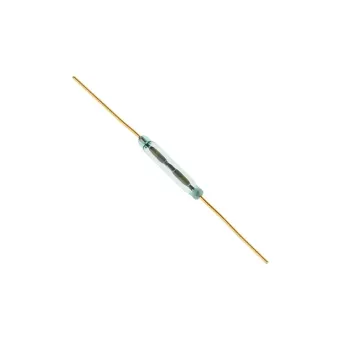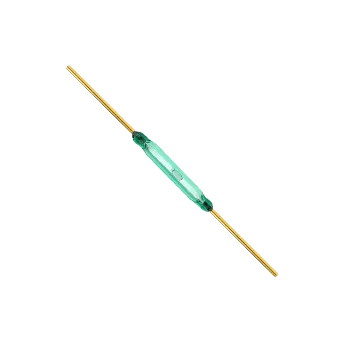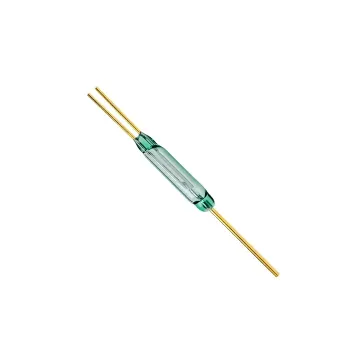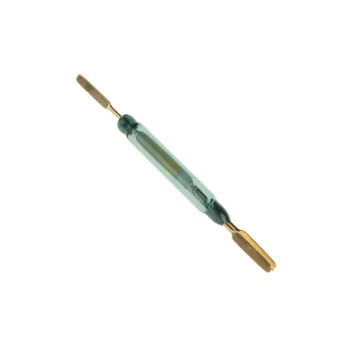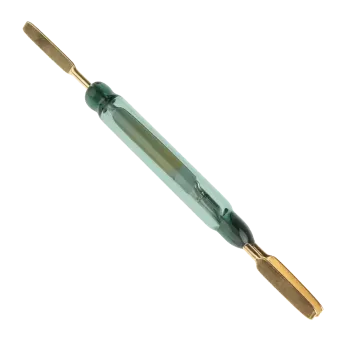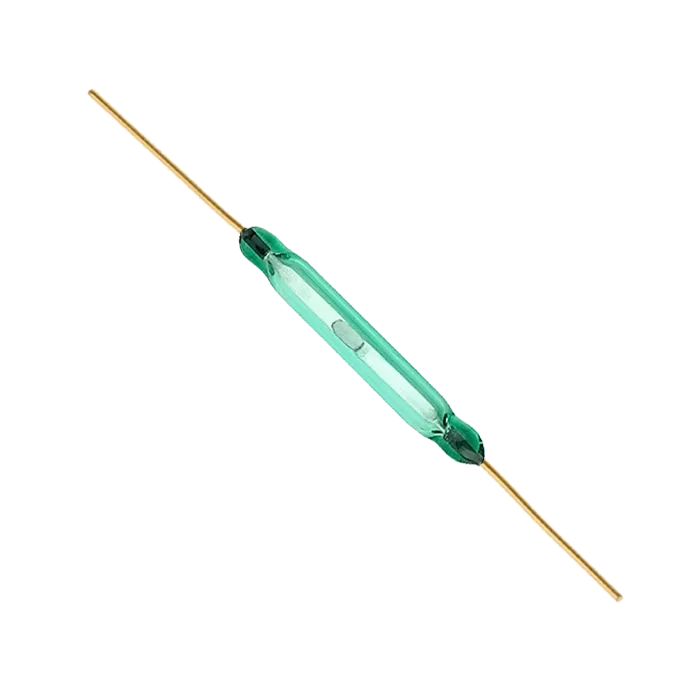
- Stock: Out Of Stock
- Model: A1555.REED28-2P
28mm Reed Switch NO 2 Pin
A reed switch is an electromechanical device that is primarily used in low voltage and current circuits. It is composed of two flexible ferromagnetic metal strips (reeds) enclosed in a glass tube. The operation of the reed switch involves the opening or closing of contacts under the influence of an external magnetic field.
Key Features
- Magnetic Interaction: The reed switch operates through magnetic fields. The metal strips inside establish contact and close the circuit when a magnetic field is applied. Conversely, the circuit opens when the magnetic field is withdrawn.
- Variety of Types: Reed switches come in several types, including Normally Open (NO), Normally Closed (NC), and Changeover (SPDT). In an NO type, the circuit closes when a magnetic field is applied; in an NC type, the circuit opens when a magnetic field is applied.
- Durability: The glass tube safeguards the metal strips from environmental elements, enhancing the switch's durability and reliability.
- Compact Size: The reed switch's small and lightweight design makes it suitable for a wide range of electronic and mechanical systems.

Technical Specifications
- Voltage Range: 3.3V ~ 60VDC
- Load Current Max.: 2.5A
- Switching Current: 1.0A
- Max Contact Rating: 30W
- Response Frequency: 2200Hz
- Mechanical & Electrical Lifecycle: ≈ 100,000
- Contact Resistance: 200mΩ
- Insulation Resistance: 10Ω
- Operating Temperature Range: -50 to 140°C
- Length: 28 mm
- Approx Weight: 2 gm

Applications
- Sensor Systems: Reed switches are used in door and window alarm sensors, bicycle speedometers, and for detecting the presence or absence of a magnetic field.
- Electronic Devices: They are employed in computer keyboards, household appliances, medical devices, and various electronic gadgets.
- Automotive Industry: Reed switches are used to detect the position of doors, seat belts, and other movable parts in vehicles.
- Industrial Automation: They are utilized for position and movement detection in industrial machines and equipment.
Advantages
- Electrical Isolation: The glass tube provides isolation from environmental factors, ensuring high reliability.
- Low Power Consumption: Due to its magnetic operation, it operates with low power.
- Long Lifespan: Minimal wear and tear due to the absence of mechanical contacts, leading to a long operational life.
- High-Speed Switching: Responds within milliseconds, suitable for applications requiring quick switching.
Disadvantages
- Magnetic Interference: Can be affected by nearby magnetic fields, causing unwanted switching.
- Fragility: The glass tube can be fragile and prone to damage from physical impact.
- Limited Current Capacity: Not suitable for high current applications.
Example Connection
You can use a reed switch with an Arduino to create a simple circuit, such as turning on an LED when the reed switch is activated:
int reedPin = 2; // Pin connected to the reed switch
int ledPin = 13; // Pin connected to the LEDvoid setup() {
pinMode(reedPin, INPUT);
pinMode(ledPin, OUTPUT);
}void loop() {
int reedState = digitalRead(reedPin); // Read the state of the reed switch if (reedState == HIGH) {
digitalWrite(ledPin, HIGH); // Turn on the LED
} else {
digitalWrite(ledPin, LOW); // Turn off the LED
}
}
A reed switch is a versatile and reliable switching device that operates using a magnetic field. It is ideal for low voltage and current applications and is widely used in sensor systems, electronic devices, the automotive industry, and industrial automation. The advantages include low power consumption, high reliability, and a long lifespan. However, they can be affected by magnetic interference and are not suitable for high current applications. The compact and durable design makes reed switches an essential component in many applications.

